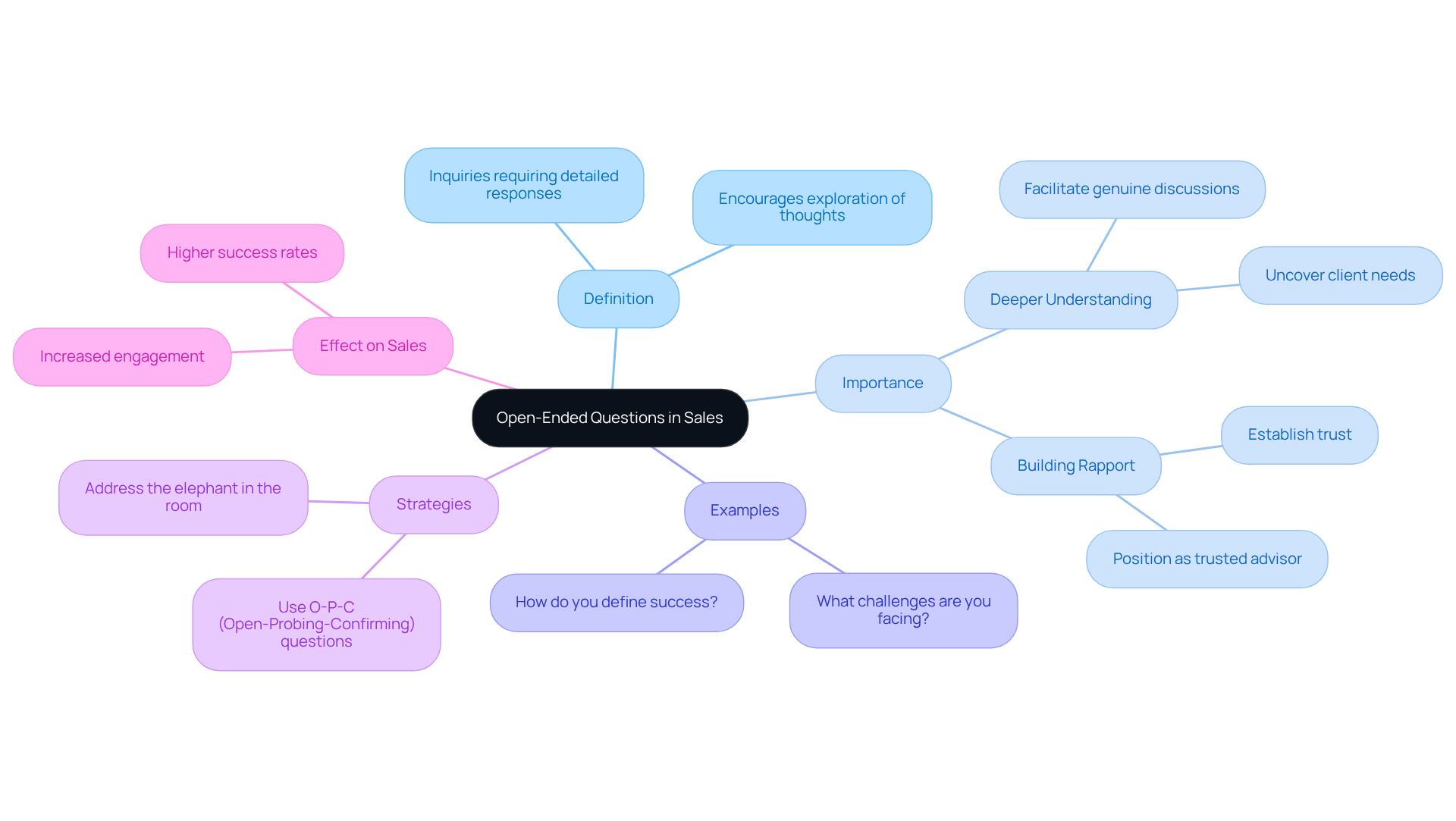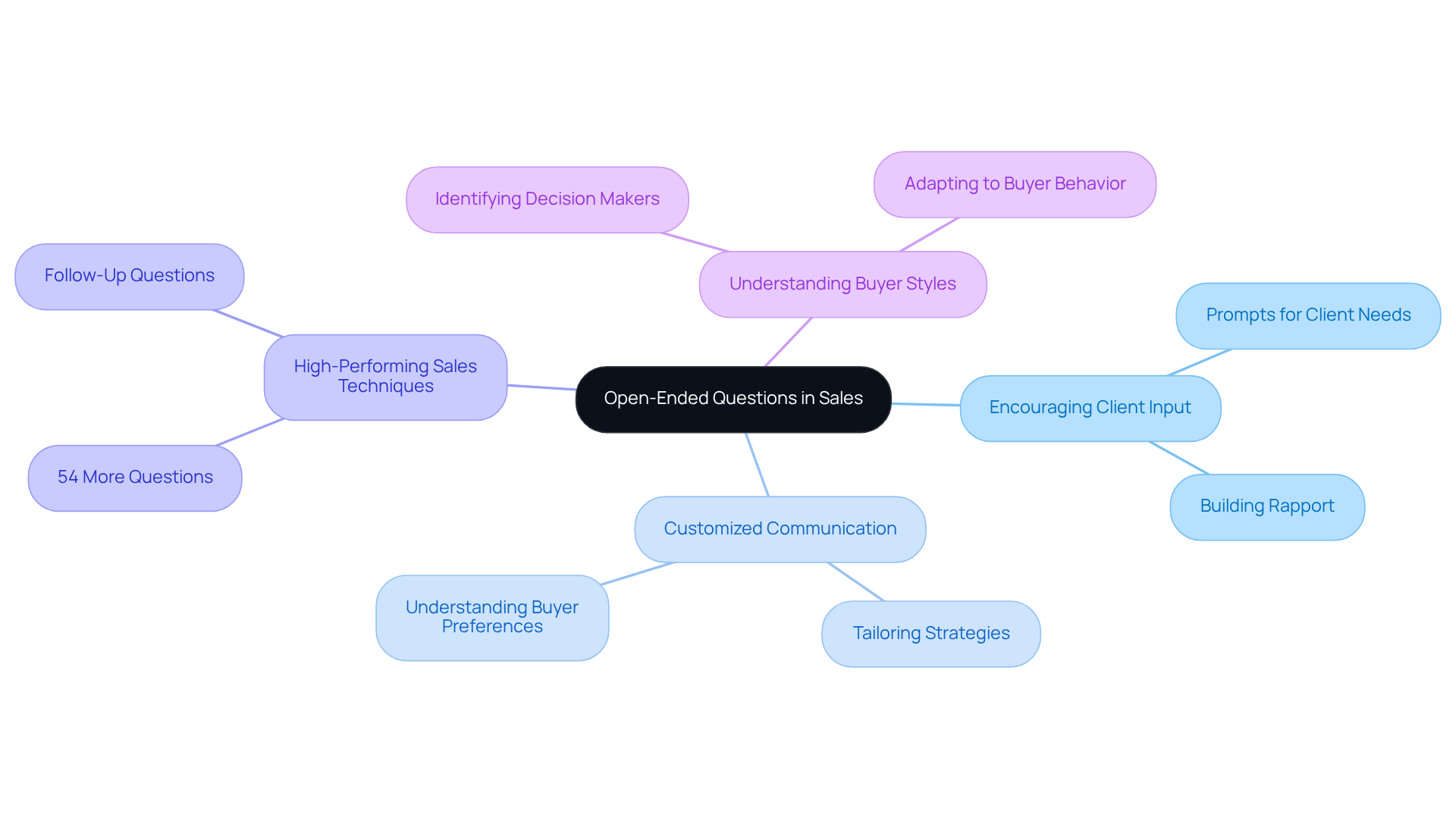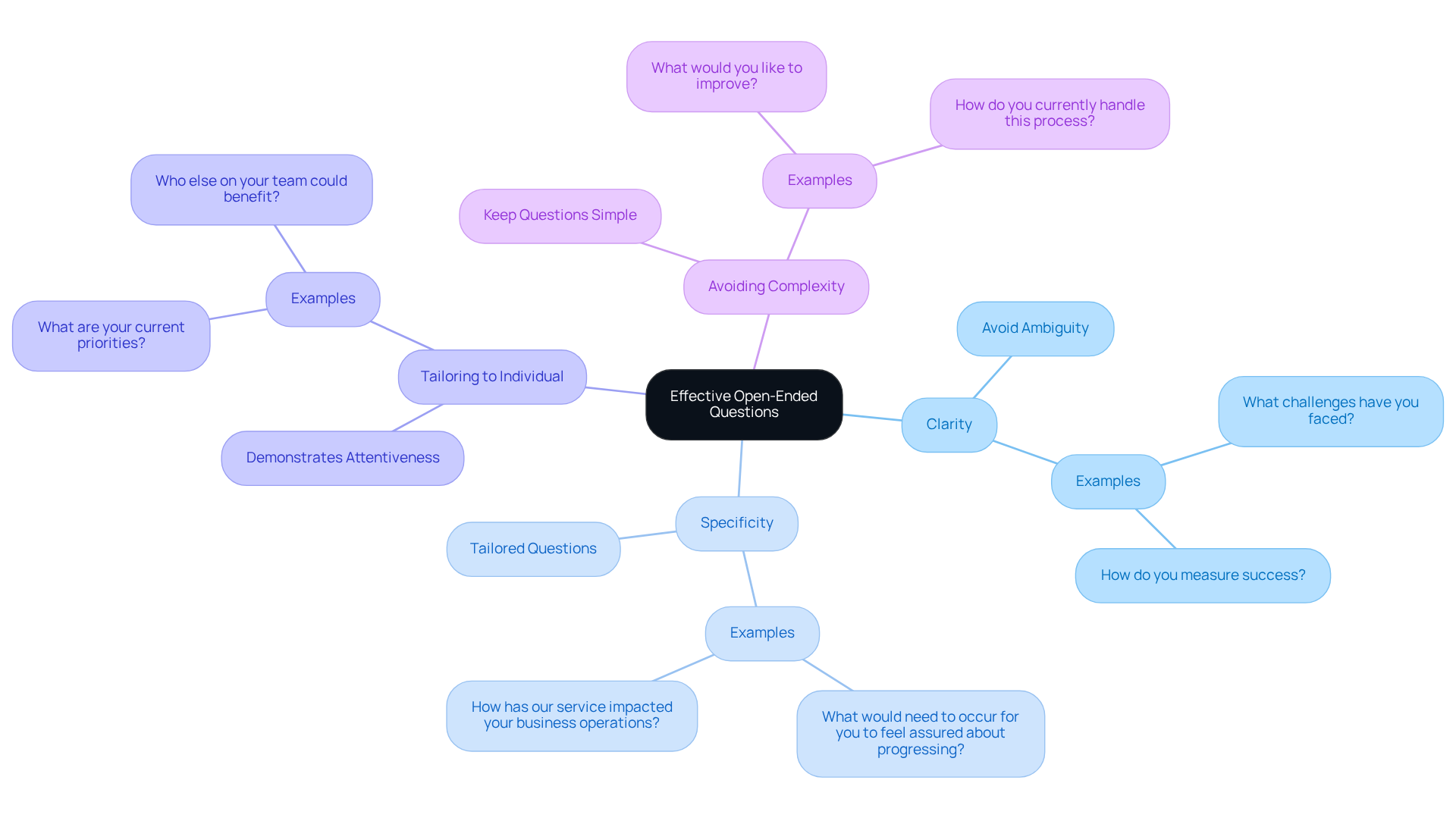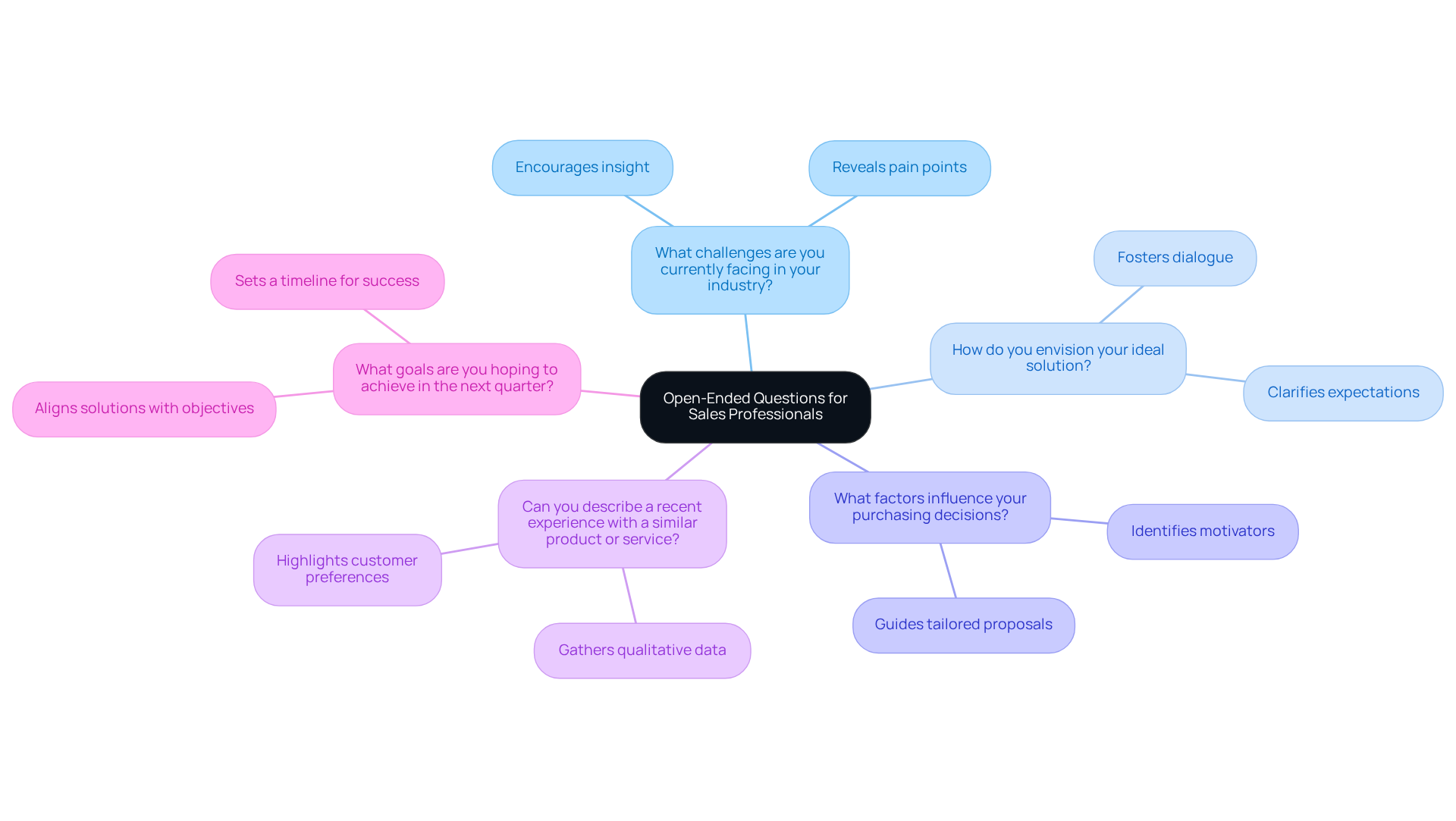
Overview
The article underscores the critical role of open-ended questions in enhancing sales success. By fostering deeper client interactions and insights, these inquiries are not just beneficial; they are essential. Effective questions prompt detailed responses, which in turn cultivate stronger relationships and drive higher conversion rates. Statistics reveal a compelling truth: high-achieving sales representatives ask significantly more questions than their peers, illustrating the direct correlation between inquiry and success.
To truly grasp the impact of open-ended questions, consider this: they not only encourage dialogue but also unveil client needs and preferences that might otherwise remain hidden. This deeper understanding allows sales professionals to tailor their approaches, ultimately leading to more effective solutions and satisfied clients.
In conclusion, embracing the art of asking the right questions is not merely a tactic; it’s a strategy that can transform sales outcomes. Sales teams should prioritize training in this area, ensuring that every interaction is an opportunity for insight and connection. By doing so, they position themselves not just as sellers, but as trusted advisors, ready to meet the evolving needs of their clients.
Introduction
Open-ended questions stand as the unsung heroes of successful sales conversations, transforming simple inquiries into gateways for deeper understanding and connection. They invite clients to share their thoughts and experiences, allowing sales professionals to uncover critical insights that not only inform their strategies but also foster trust and rapport.
However, crafting these questions effectively poses a challenge. What truly makes an open-ended question resonate with potential clients? This article delves into the art of formulating impactful open-ended questions, exploring their significance in sales interactions and how they can significantly boost success rates. By mastering this skill, sales professionals can elevate their conversations, leading to more meaningful engagements and ultimately, greater success.
Define Open-Ended Questions and Their Importance in Sales
Open-ended prompts are inquiries that demand more than a simple 'yes' or 'no,' such as what are some open ended questions? They require respondents to provide detailed and thoughtful answers, including what are some open ended questions. In the realm of commerce, understanding what are some open ended questions is vital; they encourage potential clients to articulate their thoughts, emotions, and motivations, leading to a deeper understanding of their needs. For example, asking, "What challenges are you currently facing in your business?" invites the potential client to elaborate on their situation, offering valuable insights that can guide the discussion. This method not only fosters rapport but also leads one to consider what are some open ended questions that can position the salesperson as a trusted advisor rather than merely a vendor.
Significantly, sales representatives who achieve 120% of their targets discuss features and technical subjects 39% less than those who fall short of their quotas. This statistic underscores the effectiveness of exploratory inquiries in driving sales success. As Jen emphasizes, the objective of a discovery conversation is to help the prospect uncover more about their own business by exploring what are some open ended questions, not just to sell. Addressing the 'elephant in the room' can be facilitated by considering what are some open ended questions that can lead to more genuine and productive discussions.
Moreover, incorporating specific inquiries, including what are some open ended questions, can enhance the precision of investigations, while follow-up probing prompts can further enrich the conversation. Confirming inquiries are also crucial, as they validate understanding and ensure effective communication. By employing these strategies, professionals can uncover essential information that informs their approach, ultimately boosting the efficiency of their strategies and enhancing overall success rates.

Explore the Role of Open-Ended Questions in Sales Interactions
Open-ended inquiries are essential in commercial interactions, as they cultivate a two-way conversation that encourages potential clients to articulate their needs and preferences. Instead of merely asking, 'Are you interested in our product?', consider a more impactful approach: 'What features do you find most valuable in a product like ours?' This type of inquiry not only prompts the potential client to express their priorities but also equips the salesperson with the insights needed to tailor their pitch effectively.
Creating an environment where potential clients feel comfortable sharing their thoughts allows professionals to forge connections and significantly enhance their chances of closing deals. This approach aligns with the understanding that different buyer styles necessitate customized communication strategies, ultimately leading to more fruitful and meaningful conversations. Notably, high-achieving sales representatives ask 54% more questions than their average counterparts, underscoring the role of broad inquiries in boosting revenue outcomes.
Moreover, grasping a buyer's behavioral style early in the discussion enables professionals to refine their inquiries, thereby enhancing both the conversation and the relationship-building process. By prioritizing what are some open ended questions, sales professionals can gather valuable information and foster a collaborative atmosphere that drives success.

Identify Key Characteristics of Effective Open-Ended Questions
In sales discussions, understanding what are some open-ended questions is essential, as they possess key characteristics that significantly enhance their impact. They typically begin with prompts like 'what,' 'how,' or 'why,' which illustrate what are some open ended questions that naturally encourage respondents to elaborate on their thoughts. For instance, instead of asking, 'What do you think about our service?' consider a more effective approach: 'How has our service impacted your business operations?' This subtle shift invites a more detailed and meaningful response.
Clarity and specificity are crucial in crafting these inquiries; ambiguity can confuse respondents and hinder the conversation. Tailoring questions to the individual's unique circumstances not only demonstrates attentiveness but also fosters deeper involvement. For example, asking, 'What challenges have you faced in your current process?' directly addresses the individual's context, prompting them to share valuable insights.
By integrating these traits, sales experts can formulate inquiries, such as what are some open ended questions, that promote insightful dialogues, leading to a deeper understanding of client needs and enhancing the overall sales process. Remember, closed-ended inquiries often yield brief or one-word responses, while engaged prospects are more likely to converse, revealing their true pain points. Attentive listening is vital when posing broad inquiries, as it enables salespeople to respond appropriately and build rapport. However, it's essential to avoid overly complicated questions, which can result in short or unhelpful responses.
Examples of effective exploratory inquiries include prompts like:
- 'What would need to occur for you to feel assured about progressing?'
- 'How do you currently measure the success of technology investments?'
These examples illustrate how effective questioning can lead to more productive sales conversations, ultimately driving better outcomes for both the salesperson and the client.

Provide Examples of Open-Ended Questions for Sales Professionals
Sales experts can significantly enhance their discussions by integrating inquiries that consider what are some open ended questions to foster deeper dialogue and reveal customer challenges. Consider these impactful examples:
- "What challenges are you currently facing in your industry?"
- "How do you envision your ideal solution?"
- "What factors influence your purchasing decisions?"
- "Can you describe a recent experience with a similar product or service?"
- "What goals are you hoping to achieve in the next quarter?"
These questions not only encourage prospects to share valuable insights but also empower salespeople to tailor their offerings as solutions to specific needs. Research indicates that sales experts who consistently utilize exploratory inquiries enjoy higher conversion rates, highlighting the effectiveness of this approach. By incorporating what are some open ended questions into their marketing strategy, professionals can forge deeper connections, build trust, and achieve more successful outcomes. This method transforms sales conversations from mere transactions into consultative discussions, ultimately enhancing the overall sales process.
Moreover, follow-up questions are crucial for eliciting deeper insights. However, it's essential to avoid overwhelming prospects with excessive 'why' questions, as they may come across as accusatory. Striking the right balance in questioning can lead to more fruitful interactions and a better understanding of customer needs.

Conclusion
Open-ended questions are a powerful strategy in the sales process, enabling sales professionals to engage potential clients in meaningful dialogue. These inquiries not only elicit detailed responses but also create an environment where clients feel comfortable sharing their needs and challenges. By shifting the focus from a transactional approach to one that prioritizes understanding and collaboration, salespeople can position themselves as trusted advisors rather than mere vendors.
Crafting effective open-ended questions is crucial for encouraging deeper conversations. Clarity, specificity, and attentiveness in questioning enhance the quality of interactions. For instance, impactful questions can reveal client motivations, allowing sales professionals to tailor their offerings to meet specific needs.
Integrating open-ended questions into sales strategies goes beyond merely increasing conversion rates; it’s about building relationships and trust. By embracing this approach, sales experts can transform their conversations, leading to more productive outcomes and a greater understanding of client needs. Fostering this dialogue is essential for achieving long-term success in sales, making it imperative for professionals to refine their questioning techniques and engage with clients on a deeper level.
Frequently Asked Questions
What are open-ended questions?
Open-ended questions are inquiries that require more than a simple 'yes' or 'no' answer, prompting respondents to provide detailed and thoughtful responses.
Why are open-ended questions important in sales?
Open-ended questions are vital in sales as they encourage potential clients to articulate their thoughts, emotions, and motivations, leading to a deeper understanding of their needs.
Can you provide an example of an open-ended question in a sales context?
An example of an open-ended question is, 'What challenges are you currently facing in your business?' This type of question invites the client to elaborate on their situation, providing valuable insights.
How do open-ended questions affect sales success?
Sales representatives who effectively use open-ended questions tend to achieve higher sales targets. Those who reach 120% of their targets discuss features and technical subjects 39% less than those who do not meet their quotas, highlighting the effectiveness of exploratory inquiries.
What is the objective of a discovery conversation in sales?
The objective of a discovery conversation is to help the prospect uncover more about their own business through exploration, rather than just focusing on selling.
How can specific inquiries enhance sales conversations?
Incorporating specific inquiries can enhance the precision of investigations, while follow-up probing prompts can enrich the conversation, leading to more genuine and productive discussions.
What role do confirming inquiries play in sales communication?
Confirming inquiries validate understanding and ensure effective communication, helping professionals uncover essential information that informs their approach and boosts their strategies' efficiency.
FAQs











